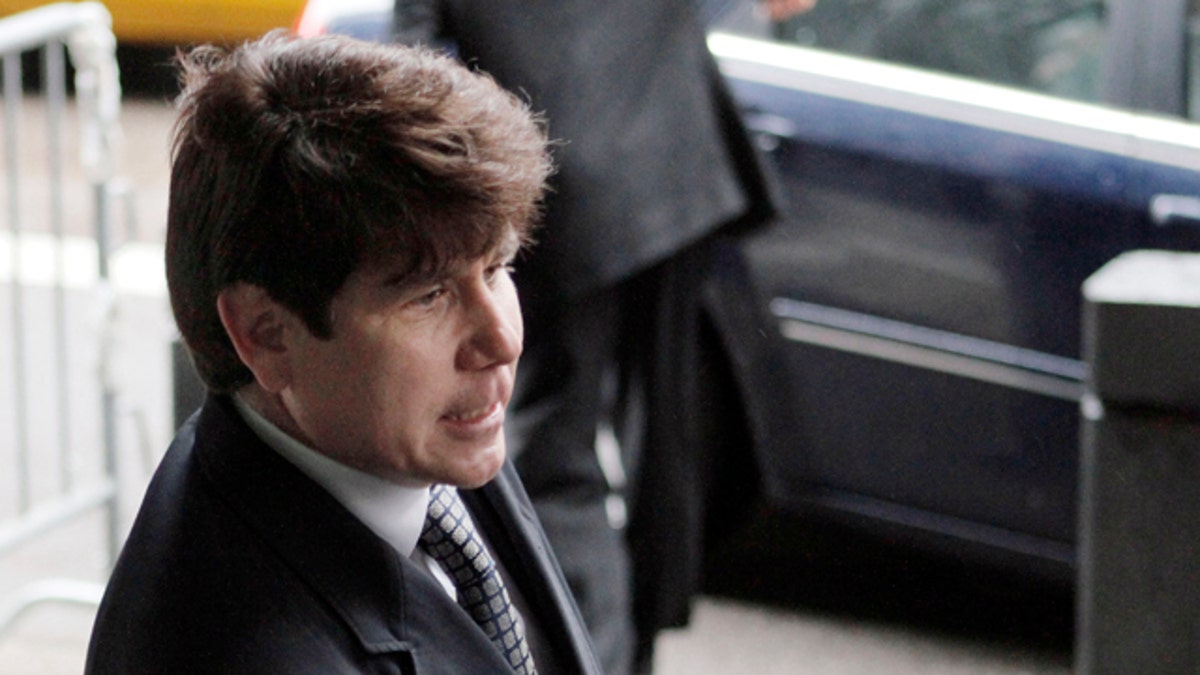
May 26: Former Illinois Gov. Rod Blagojevich, arrives at federal court before taking the stand in his second corruption trial in Chicago. (AP)
CHICAGO – Addressing the most explosive charge against him, ousted Illinois Gov. Rod Blagojevich told jurors Tuesday that he never sought to sell President Barack Obama's vacated U.S. Senate seat, but that he kicked around all kinds of ideas — "good ones, bad ones, stupid ones" — over whom to appoint to the position.
Blagojevich's comments came during his third day on the witness stand at his corruption retrial, as his defense attorneys asked him for the first time in court to answer the government's allegations that he endeavored to sell or trade Obama's Senate seat for a top job or campaign cash.
Blagojevich said he wasn't enticed by pay-to-play proposals such as offers from fundraisers close to U.S. Rep. Jesse Jackson Jr. to raise millions of dollars in campaign cash for the then-governor if he named Jackson to the seat.
"That's illegal," Blagojevich told the jury. "That's not what I wanted to do. . . . I was opposed to the offer of fundraising in exchange for the Senate seat."
Blagojevich also echoed a long-held defense argument that all the FBI wiretaps that capture him talking about how he might benefit from naming someone to seat was just that — talk.
Asked by his attorney, Aaron Goldstein, if he spoke frequently about the seat in the weeks before his arrest on Dec. 9, 2008, Blagojevich did not miss a beat.
"Absolutely, yes," Blagojevich said. "Incessantly."
He explained that his method for arriving at a decision on the seat — which he said he knew would be one of the most momentous of his life — was to talk with as many confidants as possible.
"I wanted to be very careful to invite a full discussion of ideas . . . good ones, bad ones, stupid ones," he said. "I obviously had a hard time making this decision, but there was a method to the madness."
Blagojevich spoke about the Senate seat only for about an hour Tuesday, so the defense touched on only a few details of the charge and did not roll out all his expected denials. He is expected to talk about the seat when he testifies again Wednesday.
The twice-elected governor did briefly mention that he got word in November 2008 that Obama may be interested in seeing family friend Valerie Jarrett named as his replacement.
Citing an FBI wiretap transcript, Goldstein asked Blagojevich what he meant when he is heard saying to an aide about the seat, "We could get something for that couldn't we?" In the same conversation, he mentions the possibility of becoming health and human services secretary. Prosecutors entered that conversation into evidence during their three-week case to support their claim Blagojevich sought early on to get something of personal benefit for the seat.
Explaining what he meant by the comment, Blagojevich told jurors Tuesday that he had in mind what he described as legal, political horse-trading.
Blagojevich also rattled off a series of candidates he was considering before Obama's election as president in November 2008, and Jackson wasn't on the list, which included Illinois Attorney General Lisa Madigan and several African-American politicians.
Blagojevich eventually appointed former Illinois Attorney General Roland Burris, who is black.
Earlier Tuesday, Blagojevich devoted most of his testimony to allegations that he tried to squeeze executives for cash, including road builder Gerald Krozel and hospital CEO Patrick Magoon.
"Rod, did you ever try to shake down Gerry Krozel for a political donation?" Goldstein asked.
"No, no," Blagojevich responded, shaking his head slightly.
Krozel had testified earlier for the government that Blagojevich pressured him by dangling the possibility that he might launch a multibillion-dollar highway program urgently needed by the ailing industry. Krozel said Blagojevich made it clear the state program was contingent on the donation.
Prosecutors also accuse Blagojevich of threatening to cancel an $8 million pediatric care reimbursement unless the CEO of Children's Memorial Hospital in Chicago came up with a campaign donation.
Magoon testified for prosecutors that he never made the donation because he felt wrongly pressured by Blagojevich.
Blagojevich said Tuesday that he never tied the reimbursement action to any campaign cash, insisting he had a good relationship with Magoon, who had donated money to him in the past.
Prosecutors objected more than 40 times when Blagojevich slid off on tangents, turning to face the jury as he tried to detail popular policies, including his efforts to keep tollway fees from rising and "get results for people."
Judge James Zagel again warned Blagojevich not wax on about other matter when asked simple questions.
"I understand that given your background that maybe you would like to give us a lesson about how government works," Zagel said. "Just answer the questions."
Blagojevich, 54, denies all wrongdoing. He faces 20 criminal counts, including attempted extortion, conspiracy to commit bribery and wire fraud. If convicted on all counts, the maximum penalty is a 350-year prison term, though guidelines would suggest he get far less. Among the considerations a federal sentencing judge can factor in is whether a defendant lied on the witness stand.
In his first trial last year, Blagojevich was convicted of lying to the FBI.

